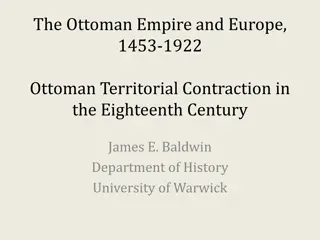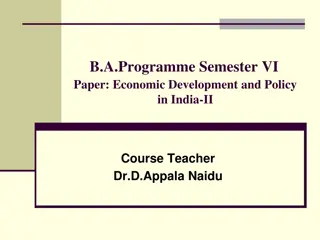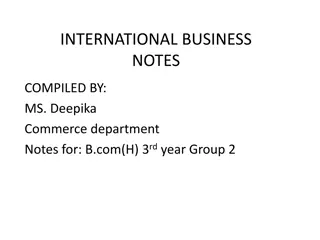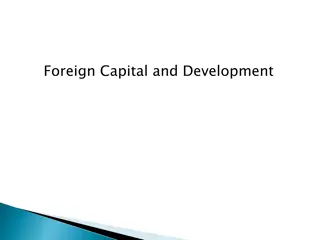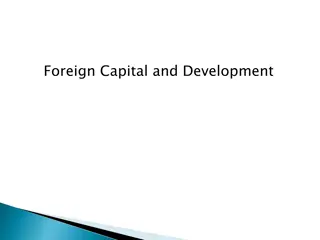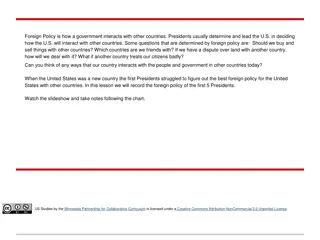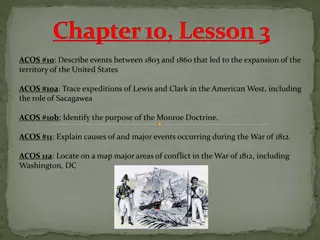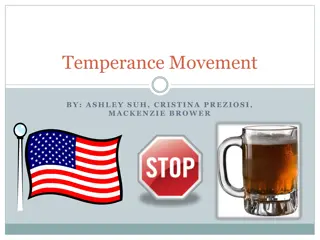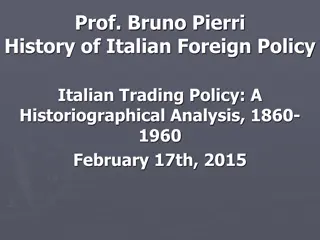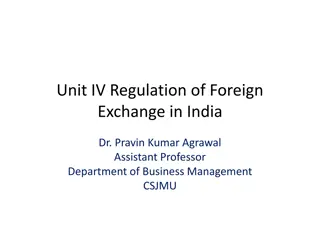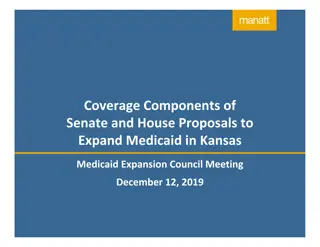U.S. Expansion and Foreign Policy in the Early 19th Century
The U.S. focused on increasing foreign trade, expanding its borders, and isolating itself from European conflicts during the early 19th century. Key events such as the Louisiana Purchase, annexation of Texas, and treaties with China shaped U.S. foreign policy. Debates over slavery, territorial expansion, and federal power were prominent, leading to significant national tensions and initiatives.
Download Presentation

Please find below an Image/Link to download the presentation.
The content on the website is provided AS IS for your information and personal use only. It may not be sold, licensed, or shared on other websites without obtaining consent from the author.If you encounter any issues during the download, it is possible that the publisher has removed the file from their server.
You are allowed to download the files provided on this website for personal or commercial use, subject to the condition that they are used lawfully. All files are the property of their respective owners.
The content on the website is provided AS IS for your information and personal use only. It may not be sold, licensed, or shared on other websites without obtaining consent from the author.
E N D
Presentation Transcript
www.Apushreview.com Period 4: 1800 1848 APUSH Review: Key Concept 4.3 Everything You Need To Know About Key Concept 4.3 To Succeed In APUSH
The New Curriculum Key Concept 4.3 US interest in increasing foreign trade, expanding its national borders, and isolating itself from European conflicts shaped the nation s foreign policy and spurred government and private initiatives. Page 42 of the Curriculum Framework Big ideas: How did the US increase its control of North America? How did both the North and South oppose the power of the federal government? How was slavery seen as a divisive issue during this time?
Key Concept 4.3 I Struggling to create an independent global presence, US policymakers sought to dominate the North American continent and to promote its foreign trade. pg 42 of the curriculum framework After the Louisiana Purchase, the US began to expand trade and contact beyond its borders: Oregon border: US and Canada eventually settled on the 49th parallel Annexing Texas: After Texas declared independence, the US added Texas in 1845 (debates over slavery) Trading with China: Treaty of Wanghia (1844) improved trading rights for US in China US sought to dominate North America through military, judicial actions, and diplomatic efforts: Monroe Doctrine: Warned Europe to stay out of Latin America, in return US would stay out of European affairs Webster-Ashburton Treaty: helped resolve the Maine/Canada boundary dispute (Aroostook War)
Key Concept 4.3 II Various American groups and individuals initiated, championed, and/or resisted the expansion of territory and/or government powers. pg 42 of the curriculum framework Debates raised over expansion and incorporation of new territories Slave vs. non-slave areas (Missouri Compromise desire to balance the number of slave and free states) Northern and Southern States resisted the authority of the federal government Hartford Convention: New England reaction to the War of 1812 and embargoes against Britain (Federalists) Nullification Crisis: Southern reaction to high tariffs (South Carolina Exposition and Protest) Those living on the frontier advocated expansion Warhawks during War of 1812 Henry Clay After War of 1812, Natives on the frontier were less of a threat -> pushed further west Native American conflicts and federal efforts to control Natives Indian Removal Act supported by Southerners, pushed Natives west of the Mississippi River Trail of Tears (1837) forced removal west of Mississippi Seminole Wars series of wars with Natives in Florida
Key Concept 4.3 III Source: Thomas Jefferson to John Randolph, April 22, 1820 The American acquisition of lands in the West gave rise to a contest over the extension of slavery into the western territories as well as a series of attempts at national compromise. pg 43 of the curriculum framework Missouri Compromise had short term success, but eventually broke down 3 parts ME = free, MO = slave, 36 30 Thomas Jefferson warned of the effects MO Compromise was later overturned by KS-NB Act - > Bleeding Kansas Slavery expanded to the Southwest -> increased tensions and debates over national goals, priorities, and strategies [T]his momentous question, like a firebell in the night, awakened and filled me with terror. I considered it, at once as the [death] knell of the Union. It is hushed, indeed, for the moment. But this is a reprieve only, not a final sentence. A geographical line, coinciding with a marked principle, moral and political, once conceived and held up to the angry passions of men, will never be obliterated; and every new irritation will mark it deeper and deeper.
Test Tips Multiple-Choice and Short Answer Questions: States vs. federal government tensions US increasing its power in North America Expansion and Native Americans Missouri Compromise Essay Questions: Ways that regions resisted the power of the federal government Impacts of expansion (politically, socially, economically) on America and various groups (Natives) Missouri Compromise (as part of other compromises leading to Civil War) Good luck in May!
Thanks for watching! Subscribe to my channel Help spread the word Questions? Comments? Leave in comments I fear people will not subscribe to Adam Norris.


